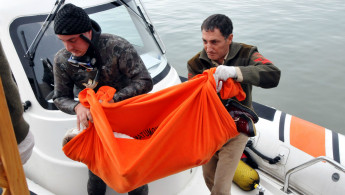Migrant boat sinks off Greek island, bodies recovered
Greek rescuers recovered the bodies of seven drowned refugees, including that of young boy on Wednesday, a day after more than 1200 people were rescued off Libya's coast.
2 min read
46,000 refugees have arrived to Greece so far this year [Getty]
Greek rescuers recovered the bodies of seven drowned refugees, including that of a young boy on Wednesday after their boat sank off Kos island, the coastguard said.
The bodies were found during a rescue operation that was launched after a survivor reported the sinking.
The man had managed to swim to an islet near Kos, where he raised the alarm.
Three Greek patrol boats, two vessels from EU border agency Frontex and an NGO boat took part in the operation, the coastguard said.
The tragedy comes just five days after 45 people including 20 children drowned off Kalolimnos near Kos on Friday.
More than a million people headed to Europe in search of new lives last year, most of them refugees fleeing conflict in Syria, Iraq and Afghanistan in the continent's worst refugee crisis since World War II.
The onset of winter does not appear to have deterred the migrants, with boats still arriving on the Greek islands from Turkey daily.
The UN says more than 46,000 people have arrived in Greece so far this year, 31 times more than for all of January 2015.
The EU is mulling allowing states in the passport-free Schengen zone to reintroduce border checks for up to two years to cope with the refugee crisis.
Greece's interior minister for migration Yiannis Mouzalas said such an extension would put Greece in a "difficult" situation by making it harder for new arrivals to continue on to northern Europe.
Hundreds rescued off Libya’s coast
On Tuesday, Italy's coast guard said it had coordinated the rescue of 1,271 migrants from rubber and wooden boats in several operations off the coast of Libya.
Italy was long at the frontier of seaborne migration from North Africa, but most of the hundreds of thousands of people arriving in Europe on rickety boats last year took a less risky route to Greece.
Vessels from the Italian navy and coast guard and a Slovenian military ship working as part of the European Union naval operation Eunavfor Med conducted the rescues.
The bodies were found during a rescue operation that was launched after a survivor reported the sinking.
The man had managed to swim to an islet near Kos, where he raised the alarm.
Three Greek patrol boats, two vessels from EU border agency Frontex and an NGO boat took part in the operation, the coastguard said.
The tragedy comes just five days after 45 people including 20 children drowned off Kalolimnos near Kos on Friday.
More than a million people headed to Europe in search of new lives last year, most of them refugees fleeing conflict in Syria, Iraq and Afghanistan in the continent's worst refugee crisis since World War II.
The onset of winter does not appear to have deterred the migrants, with boats still arriving on the Greek islands from Turkey daily.
The UN says more than 46,000 people have arrived in Greece so far this year, 31 times more than for all of January 2015.
The EU is mulling allowing states in the passport-free Schengen zone to reintroduce border checks for up to two years to cope with the refugee crisis.
Greece's interior minister for migration Yiannis Mouzalas said such an extension would put Greece in a "difficult" situation by making it harder for new arrivals to continue on to northern Europe.
Hundreds rescued off Libya’s coast
On Tuesday, Italy's coast guard said it had coordinated the rescue of 1,271 migrants from rubber and wooden boats in several operations off the coast of Libya.
Italy was long at the frontier of seaborne migration from North Africa, but most of the hundreds of thousands of people arriving in Europe on rickety boats last year took a less risky route to Greece.
Vessels from the Italian navy and coast guard and a Slovenian military ship working as part of the European Union naval operation Eunavfor Med conducted the rescues.
Italy used to run its own search and rescue mission for the boat migrants, but the Mare Nostrum or "Our Sea" project was stopped and replaced with the European Union's Frontex scheme, which had to be expanded as Europe faced its worst migration crisis since World War Two.
The influx of migrants has provided the European Union with one of the harshest tests in its history, leading to threats from some member states to bar Greece from the Schengen passport-free travel area.





 Follow the Middle East's top stories in English at The New Arab on Google News
Follow the Middle East's top stories in English at The New Arab on Google News


